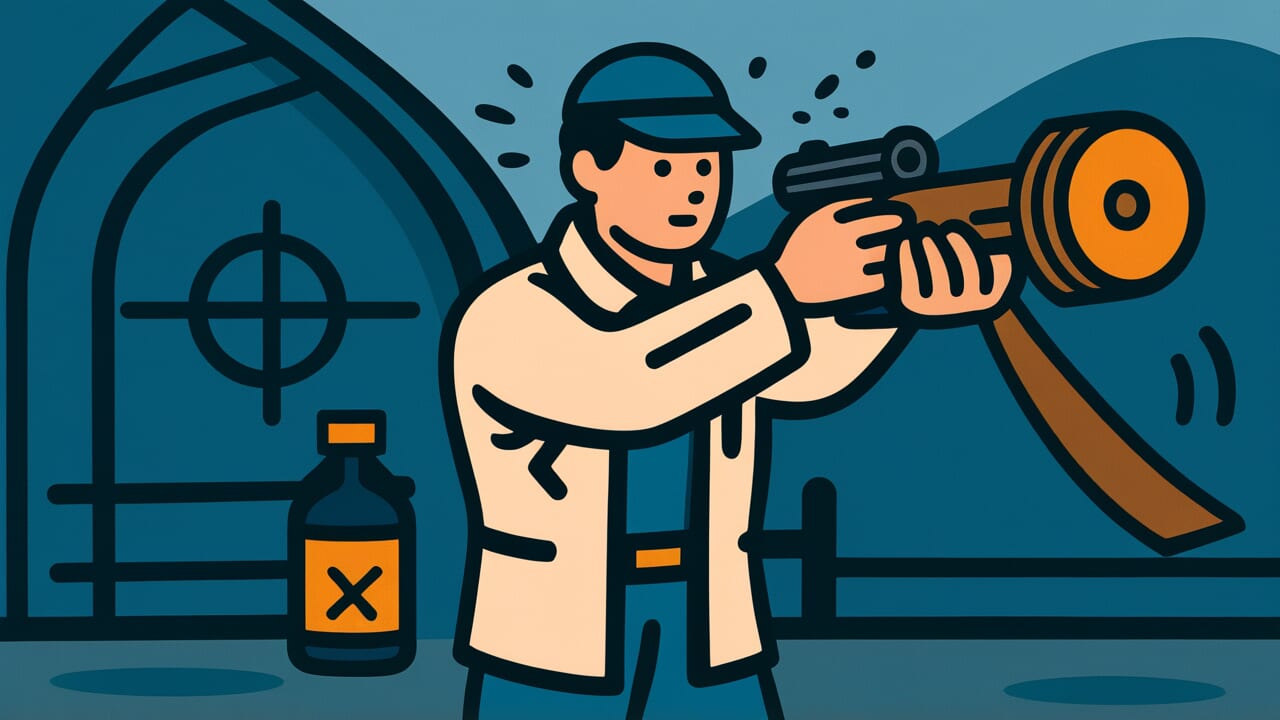How to Read “Keep your powder dry”
“Keep your powder dry”
[KEEP yur POW-der DRY]
The word “powder” refers to gunpowder, the explosive material used in old firearms.
Meaning of “Keep your powder dry”
Simply put, this proverb means stay prepared and ready for action when you need it most.
The literal words come from old military advice about gunpowder. Soldiers had to keep their gunpowder completely dry or their weapons would not fire. Wet gunpowder was useless in battle. The deeper message is about being prepared for important moments in life.
We use this saying today when talking about staying ready for opportunities or challenges. Someone might say it about keeping emergency savings for tough times. Others use it about maintaining skills they might need later. It applies to work situations where you need to be prepared for big meetings or projects.
What’s interesting about this wisdom is how it balances patience with preparation. It suggests that smart people do not just wait for things to happen. They actively maintain their readiness while they wait. People often realize this means preparation is an ongoing process, not something you do once.
Origin and Etymology
The exact origin connects to military history from several centuries ago. Early firearms used gunpowder that had to stay completely dry to work properly. Soldiers learned this lesson through dangerous experience on battlefields.
This type of saying mattered greatly during times when people depended on simple tools for survival. Military wisdom often became everyday advice because everyone understood the stakes. Communities valued practical knowledge that could mean the difference between success and failure.
The phrase spread as firearms became more common in civilian life. Hunters and settlers used the same equipment as soldiers. Over time, people began using the expression for any situation requiring preparation. It moved from literal military advice to general wisdom about staying ready for life’s challenges.
Interesting Facts
The word “powder” in this context specifically means gunpowder, which was invented in ancient China and reached Europe by the 13th century. Early gunpowder was extremely sensitive to moisture and would completely fail to ignite when wet.
This proverb uses a concrete military image to express an abstract concept, which is a common pattern in English sayings. The physical reality of keeping gunpowder dry made it a perfect metaphor for general preparedness.
Usage Examples
- Manager to team: “The merger talks are still ongoing, so don’t celebrate yet – keep your powder dry.”
- Coach to player: “You’re leading by two points with five minutes left – keep your powder dry.”
Universal Wisdom
This proverb captures a fundamental tension in human survival between action and preparation. Throughout history, our ancestors discovered that success often depends not just on what you do in critical moments, but on what you did beforehand to make success possible.
The deeper truth reveals how humans must constantly balance present comfort with future uncertainty. We naturally want to relax and enjoy good times, but life regularly presents unexpected challenges. Those who maintain their tools, skills, and resources during calm periods have advantages when storms arrive. This creates a psychological challenge because preparation requires effort without immediate reward.
What makes this wisdom universal is how it addresses the gap between knowing and doing. Everyone understands that preparation matters, yet many people struggle to maintain readiness over time. The proverb acknowledges that preparation is not a one-time event but an ongoing discipline. It recognizes that the most crucial preparations happen during periods when they seem unnecessary, which goes against our natural tendency to respond only to immediate pressures.
When AI Hears This
Staying ready for unknown future events creates a hidden mental burden. Our minds constantly fight two opposing forces that drain our energy. We feel anxious about unused potential, which pushes us to act too soon. We also experience fatigue from staying alert, which makes us gradually relax. This mental taxation explains why true readiness is so rare.
Most people escape this psychological strain through predictable patterns. They either jump into action early to stop the waiting anxiety. Or they slowly let their guard down to reduce mental effort. Both responses feel logical in the moment but sabotage long-term success. The mind seeks relief from the exhausting work of sustained preparation.
What fascinates me is how humans developed strategies to manage this burden. You create routines that maintain readiness without constant conscious effort. You build habits that preserve your capacity while reducing mental load. This reveals remarkable psychological engineering – finding ways to stay sharp without burning out. The proverb celebrates those rare individuals who master this delicate balance.
Lessons for Today
Living with this wisdom requires understanding that true readiness goes beyond just having resources available. It means maintaining those resources and keeping skills sharp even when life feels comfortable. The challenge lies in sustaining preparation efforts when there is no immediate threat or opportunity visible.
In relationships and work, this wisdom suggests keeping communication skills active and professional networks maintained. People who practice this approach do not wait until they need help to build connections. They invest in relationships during good times, knowing that support systems require ongoing attention to remain strong when needed.
The broader application involves recognizing that preparation itself can become a source of confidence and calm. When people know they have maintained their readiness, they can face uncertainty with less anxiety. However, this wisdom also requires balance, as excessive preparation can become a form of worry or control that prevents people from enjoying present moments. The key insight is that steady, reasonable preparation creates freedom rather than burden, allowing people to engage fully with life while remaining ready for whatever comes next.



Comments